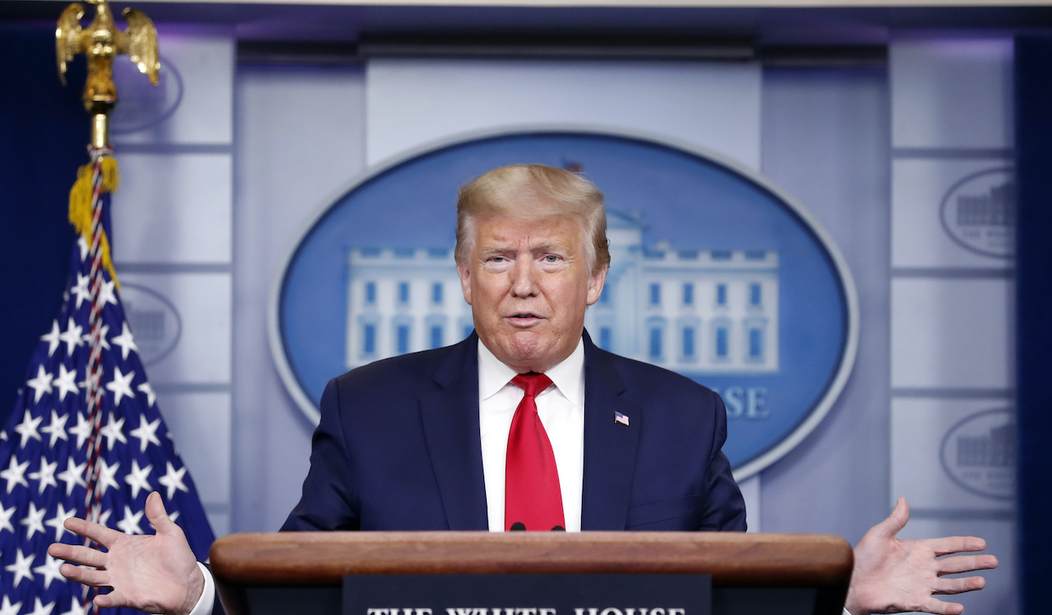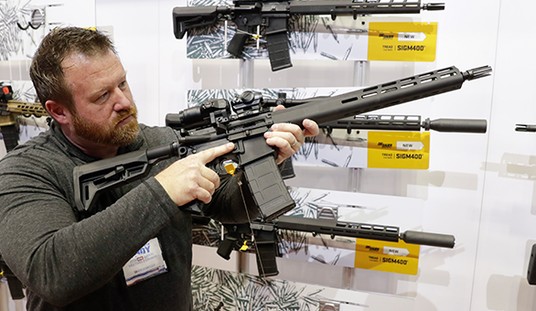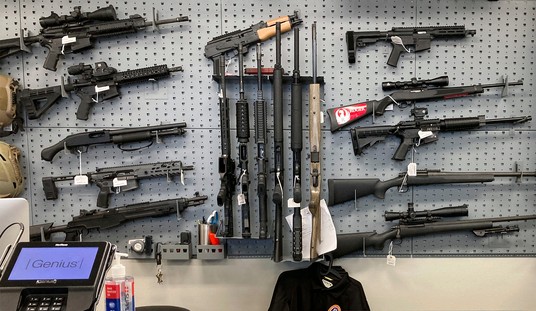What did President Donald Trump mean with his Friday tweets to “liberate” states like Michigan, Minnesota, and Virginia? Was it a call to re-open the economies of those states and begin to relax the stay-at-home orders that have shut down thousands of businesses declared non-essential, or was it a literal call to arms and insurrection?
LIBERATE VIRGINIA, and save your great 2nd Amendment. It is under siege!
— Donald J. Trump (@realDonaldTrump) April 17, 2020
Given the fact that the president’s tweets came shortly after a segment on Fox News featuring a group called Liberate Michigan, which is all about re-opening the state’s economy as soon as possible, it seems obvious to me that the president was referring to the shut down orders in these states, though his reference to Virginia’s newly-signed gun control laws added a little twist. During Friday’s COVID-19 press briefing at the White House, Trump was asked about his comments referenced the new gun control laws in the state, though gun stores (but not indoor ranges) remain open in Virginia, thanks in large part to legislation approved by lawmakers back in 2012 that curtails the ability of the governor to infringe on our right to keep and bear arms in a state of emergency.
At no time, however, did the president call for any type of violence or insurrection, despite the claims by many Democrats like Gov. Jay Inslee of Washington.
The president is fomenting domestic rebellion and spreading lies – even while his own administration says the virus is real, it is deadly and we have a long way to go before restrictions can be lifted. 2/7
— Governor Jay Inslee (@GovInslee) April 17, 2020
One-time presidential candidate Robert Francis O’Rourke, now Joe Biden’s point man on gun control, also claimed that Trump was trying to kick off a civil war with his tweets.
Republicans will turn a blind eye & too many in the press will focus on “tone.” But history books will say: In April of 2020, when the pandemic had already claimed 35,000 lives, the President of the United States incited people to storm their statehouses with AR-15s and AK-47s. pic.twitter.com/44slncrsey
— Beto O’Rourke (@BetoORourke) April 17, 2020
This is the new narrative from anti-gun Democrats: President Trump is encouraging Americans to wage war on their state governments. It’s a cheap and cynical ploy, but not surprising, given the fact that even in the face of a crisis the likes of which our nation hasn’t seen in at least 100 years, most politicians are still stuck in the pre-pandemic paradigm of pointing fingers and trying to demonize the other party (and that goes for Republicans as well as Democrats).
Personally, I don’t think that the president’s tweets were all that helpful to the cause of re-opening the economy, but the response by many Democrats was breathtakingly dishonest. The media jumped in to help advance the narrative that Trump was calling for violence as well, with NBC reporting on the protests popping up across the country urging an end to the lockdowns.
One host of the “Liberate Minnesota” event on Facebook, Don Huizenga, posted a link to the Facebook event Monday, urging peaceful protest.
“I hope to see you all there! We’ll be nice, respectful and well dressed. Bring your signs and your passion for America!” he wrote.
By Thursday, Huizenga struck a different tone.
“Some of us understand what is happening. The rest of the sheep do not. But, it was designed that way…which is why we’re speaking out and acting out,” he wrote. “Wait for the violence. It will happen. People in our culture are NOT designed to obey these kinds of orders.”
Huizenga said in a phone interview that he worked in the 6th Congressional District for Trump’s campaign. He said that he and event co-host Michele Even, who he said was a “fellow activist,” came up with the idea.
He said that while “people are really energized and Trump is an attachment to that energy,” he was more concerned about ending the lockdown because of the “precedent it sets.”
He added that the violence he anticipated in his Facebook post would not be part of the rally.
“We’re gonna do everything we can to clean up our mess when we leave, to make sure people are respectful. This is a conservative rally. I don’t expect it to be chaotic. People here really don’t want it to be chaotic,” he said.
But Huizenga reiterated his warning about violence.
“The message here that I had: Violence will happen and it will happen in two weeks when people literally don’t have any food,” he said. “When we’re pitting neighbor against neighbor, people are going to be angry. Humans aren’t designed to act like this, especially American humans aren’t used to this at all. You’re gonna rub people the wrong way. There will be violence. People are dying from the side effects of all this legislative action.”
Clearly Huizenga wasn’t talking about conservatives getting violent, but was instead talking about the potential for civil unrest by those hit hardest by the economic shutdowns. I hate to break it to NBC News, but it’s not just guys in Trump hats who are concerned about that possibility.
“What will likely prompt looting, rioting, civil unrest will beif public servicesare overloaded,” Andrew Bringuel II, a retired supervisory special agent at the FBI’s Behavioral Analysis Unit and executive director of the Behavioral Science Unit, wrote in an email. “If people lose their public trust in the confidence that the police can maintain social order, they will begin to defend themselves against those who don’t recognize the rule of law. Thomas Hobb[e]s described this as a breakdown of the social contract, and it’s really an imbalance in social equilibrium.”
“It’s a broad-base concern in terms of people being out of work, maybe neighborhood stores closing, people being concerned about assistance and unemployment benefits running out,” said Bill Johnson, executive director for the National Association of Police Organizations. “Not so much because of the virus but because of the downturn in the economy, people being out of work, and that sort of thing, typically you’re going to see an uptick first in property crime and, hopefully, it won’t happen, but you’ll have an increase in other types of crime as well.”
Both sides in the open it up/keep it shut down debate have valid points to be made, but neither side seems particularly interested in making them. Instead, we’re stuck in a cycle of stupidity, where our only options get boiled down to “keep the economy shut down until there’s a vaccine” and “return to normal right now.” Neither are likely to happen, and both would be disastrous in their own way if either did come to pass.
Instead, what we’re going to see is a soft re-opening of the economy, and even in states like Michigan, Minnesota, and Virginia, I suspect that the re-opening will begin sooner rather than later. We’re walking a tightrope at the moment, trying to get people back to work as quickly as possible without causing hospitals and public health systems to be overwhelmed. So far, we’ve been far more successful with the latter than the former, and its only natural for many Americans to be focused on the economy and their desire to get back to work, given that the most dire predictions of just a few weeks ago haven’t come to pass.
At the same time, as we re-open the economy, we can’t be stupid about it. The coronavirus is real, and while we’re still trying to figure out just how contagious and deadly the disease is, there are genuine reasons to continue to guard against the unchecked spread of the coronavirus. Even as stores re-open for business, it’s up to us as individuals to act responsibly. For folks with high risk factors, that means continuing to limit our time in stores and other enclosed areas, and to practice social distancing measures. Americans who live close together in urban areas or who use public transportation may need to practice social distancing measures for longer periods of time than those who live in rural America. There simply isn’t a one-size-fits-all solution for fighting the coronavirus.
Despite talk on social media about the Boogaloo, I don’t see that as a serious possibility. I suspect what will happen is an increasing amount of non-violent civil and civic disobedience, from stores re-opening in defiance of proclamations by governors to sheriffs announcing that they’ll use discretion in enforcing stay-at-home orders. Disobedience is in our cultural DNA, and the more governors try to crack down on things like buying seeds or organizing a political protest, the more pushback they will see from Americans who view their government as a bigger threat to their rights than the coronavirus is to their health.
So far the coronavirus hasn’t brought the nation together, but instead has shined a spotlight on the deep divides in the United States. I suspect those divides may make our recovery more messy and chaotic than in more authoritarian nations, but like Thomas Jefferson, I too prefer the boisterous sea of liberty to the waveless waters of despotism.









Join the conversation as a VIP Member